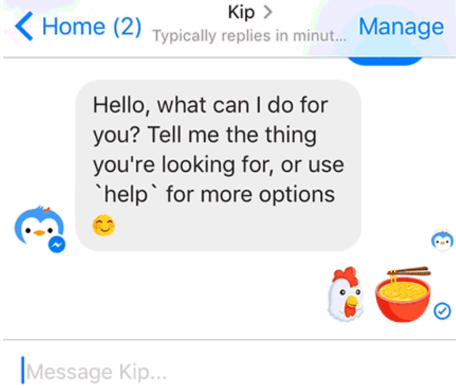New methods of engaging consumers are launched frequently. Few are successful. Conversational commerce, however, has gained widespread adoption in a short period.
Conversational commerce enables transactions via instant messaging tools, such as Facebook Messenger and WhatsApp, using chatbots. It also enables transactions via hardware-enabled smart agents, like Amazon Alexa or Google Home, which allow users to converse and purchase verbally.
An example is shopping in a brick-and-mortar clothing store and asking for a “men’s red cashmere sweater in medium size.” The store associate is able to understand the request and show men’s red cashmere sweaters in medium size.
Conversational commerce is supposed to work in the same way, using natural language search — the ability of software to understand what is being asked and then produce relevant results. This includes understanding text, voice, and emojis to make sense of the “ask” and search based on that. It’s an extension of virtual agents used on smartphones, such as Siri on an iPhone.

Amazon’s Alexa is a market leader in conversational ecommerce.
Benefits of Conversational Commerce
Guided selling has long been a part of successful ecommerce sites. For example, 1-800-Flowers has extended guided selling and has also experimented with conversational assistants in the past with some success.
Advancements in artificial intelligence have made it easier to understand natural language by overcoming the challenges of accents, sentence structures, and intent. Conversational commerce can be highly contextual if utilized from within an instant messaging tool, such as WhatsApp, thus making it more relevant to the customer.
Conversational commerce also makes the product-search process a dialogue versus one-sided, wherein the user searches for the desired product using the search box on a website. Thus, conversational commerce makes the shopping experience more engaging and helps find the desired products while also facilitating cross-selling and up-selling.
Conversational Commerce Vendors
Multiple startups offer conversational commerce capability. Here are some examples.
- Conversable is a hosted solution that enables the creation of conversational chatbots on a variety of platforms, including Facebook, Google, Skype, and Amazon. Whole Foods, Victoria’s Secret, and Sam’s Club use Conversable. The bots work with text and voice.
- Mona is an artificially-intelligent mobile-shopping assistant that is offered only for an iPhone. The assistant works like a store associate, enabling users to ask a set of questions as part of the shopping process. The assistant answers questions in real-time while continuously refining the recommended list of products.
- Automat is a startup that is still in beta but has already garnered much press. It is funded by Slack, an enterprise communication application. Automat is building chatbots for Slack, and other messaging platforms.
- Niki.ai is another chat-based, artificially-intelligent shopping assistant. It offers a chatbot SDK for the Android platform that can be integrated with existing applications. The SDK comes with a set of services for shopping, payments, and promotions.
- Satisfi is a location-based, intelligent-conversation commerce platform that works with IBM’s Watson cognitive computing system. Macy’s, for example, has deployed this in physical stores, to enable shoppers to ask questions, such as “where is the shoe section?” and “what time does the store close?”
- Kip is a smart assistant for office use to manage workplace purchases and food orders. It works with Facebook Messenger and Slack.

Interface for the Kip conversational commerce agent.
Why Adopt Conversational Commerce?
- Reach more consumers. Many potential customers use instant messaging apps, such as Facebook Messenger and WhatsApp. Conversational commerce enables access to these shoppers. Even if the conversion rate is low, it is a good start to generate more traffic.
- Real-time recommendations. Conversational commerce assistants learn based on their interactions with the user. They can offer recommendations in real-time.
- Better shopping experience. Using conversational commerce, consumers can search for products in their natural language versus using the traditional search box. The conversational bots are intelligent and can offer guidance at every step, resulting in a better shopping experience.
- Lower operational costs. Utilizing an automated agent for customer service or to offer recommendations is cheaper than using human personnel. Thus, it lowers operational costs for a retailer.
Have you tried conversational commerce on your website or mobile app? Please share your experiences in the comments, below.



